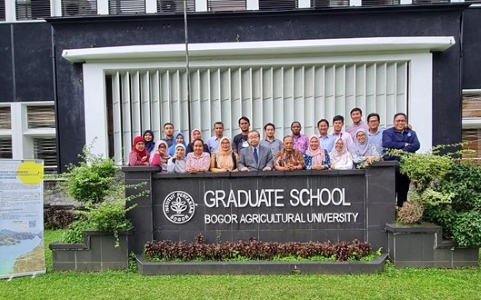PSL Doctoral Program SPs IPB University Invites Guest Lecturer from the National Institute of Genetics, Japan

The Doctoral Study Program of Natural Resources and Environmental Management (SPL) from IPB University's Graduate School held a Guest Lecture with the theme Nagoya Protocol and Access and Benefit Sharing (ABS) Implementation in Situ Cikaret Room, Baranangsiang Campus, Bogor (27/2). The guest lecture was presented by Dr Matsuaki Suzuki, Director of Industry-University Collaboration and Intellectual Property as well as Founder of ABS Support Team, National Institute of Genetics, Japan.
Guided by Prof Lina Karlinasari, Secretary of the PSL Doctoral Program as the moderator, the activity was attended by students of the PSL doctoral program at IPB University who took the Design and Complexity of Science in Natural Resource and Environmental Management (PSL170C) course. In addition, students of the Tropical Silviculture (SVK) master program who are taking the Research Methodology Course (SVK1501) also participated in this activity.
In his opening speech, Prof. Widiatmaka, Head of the Doctoral Program of PSL SPs IPB University said that the theme of this guest lecture was related to the design and complexity of science courses. "We express our appreciation and gratitude for the presence of Dr Suzuki Matsuaki in giving a guest lecture to the doctoral program students of PSL SPs IPB University. Hopefully, it can increase the knowledge and insight of our students," he said.
He explained, in the management of natural resources and the environment (PSDAL) itself, there is a discussion of the concept and application of the philosophy of science in a design of SDAL activities. This is in order to find solutions to complex development and environmental problems in search of scientific truth.
Meanwhile, Dr Matsuaki Suzuki introduced the National Institute of Genetics, Japan, which is an institution that serves the scientific community in Japan and the world by providing research infrastructure, including the Deoxyribo Nucleic Acid (DNA) Database or DNA Data Bank of Japan (DDBJ), bio-resources from various experimental organisms, and advanced genomic services.
"DDBJ has joined the International Nucleotide Sequence Database Collaboration (INSDC) with other databases, namely the National Center for Biotechnology Information (NCBI) from the United States and EMBL's European Bioinformatics Institute (EMBL-EBI) from Europe," he explained.
Dr Matsuaki Suzuki added that an important innovation in the Nagoya Protocol is the specific obligation to support compliance with domestic laws or regulatory requirements on the part of genetic resource providers and user obligations, which are reflected in mutually agreed provisions.
"All parties have to take steps with the provision that genetic resources used in their jurisdiction have been accessed in accordance with Prior Informed Consent (PIC). And that Mutually Agreed Terms (MAT) have been established, as required by the contract," he added.
Dr Matsuaki Suzuki hopes that researchers, academics or students at IPB University and in Indonesia, who are generally providers of genetic resources, can understand this procedure and apply the concept of the Nagoya Protocol to maintain the safety and preservation of Indonesia's genetic resources now and in the future. (HBL/Rz) (IAAS/RUM)



